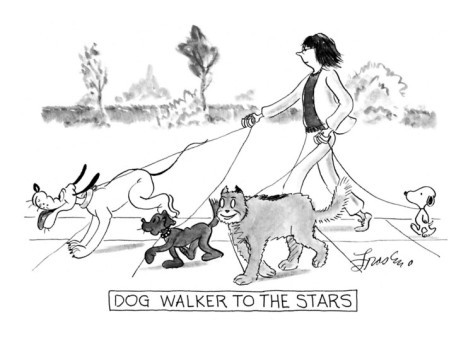Finding a reliable and trustworthy dog walker is crucial for busy pet parents. Your dog walker isn’t just someone who takes your dog for a walk; they’re a temporary guardian, a source of exercise and enrichment, and a vital part of your dog’s well-being. But with so many options available, how do you choose the right one? This guide will walk you through the essential steps to finding a dog walker who’s a perfect fit for your furry friend and your peace of mind.
Finding the Right Dog Walker: Where to Start
The internet can be a good starting point. Companies with multiple employees often have websites detailing their services. However, some of the most skilled and reliable dog walkers may not heavily advertise online, relying instead on word-of-mouth referrals. So, broaden your search beyond the web.
Ask for recommendations from trusted sources:
- Vet techs: They often have firsthand experience with various dog walkers.
- Groomers: They interact with many dog owners and hear about their experiences.
- Trainers: They understand dog behavior and can recommend walkers who are knowledgeable and capable.
- Local pet store owners: They’re connected to the local pet community.
- Rescue and shelter workers: They frequently work with dogs with different needs.
- Online directories: Check sites like the DINOS (Dogs In Need Of Space) website for walkers experienced with dogs requiring extra space or those with reactivity issues.
[
Solo Walker vs. Dog Walking Company: What’s the Difference?
Choosing between a solo dog walker and a larger dog walking company depends on your individual needs and preferences. Here’s a breakdown to help you decide:
- Solo Dog Walkers: Often provide highly personalized relationships and flexible service. They may be more adaptable to your dog’s unique needs and your specific schedule. However, availability can vary. Think of them as shopping at a small, locally owned store.
- Dog Walking Companies: Offer increased convenience and greater accountability. They often have more readily available backup walkers and established procedures. However, the service may be less personalized, with more rigid rules. This is similar to shopping at a large store.
Ultimately, both can be excellent choices. Consider what type of relationship you want and what your schedule requires. The most important thing is to thoroughly vet any potential dog walker, regardless of their employment structure.
The Interview Process: Key Questions to Ask
Once you’ve compiled a list of potential candidates, it’s time to conduct interviews. Ask these crucial questions to gauge their qualifications and experience:
- Company Structure: “If your company has multiple employees, who will actually be the person walking my dog?”
- Group Walks: “How many dogs do you walk at once? How do you choose which dogs walk with each other?”
- Training: “What kind of training do you have to walk multiple dogs at a time?”
- Contingency Plans: “What happens when you can’t make it?”
- Experience: “What kind of experience do you have with dogs?”
- Walk Locations: “Where will you go on your walks? Will you be taking my dog to the dog park?”
The Meet-and-Greet: Observing Interactions
A free consultation at your home, with no obligation to hire, is essential. This “meet and greet” allows you to observe the dog walker’s interaction with your dog. Ideally, the primary walker—the person who will be walking your dog regularly—should be present at this meeting.
Observe their interaction: Unless your dog is fearful, they should generally respond positively to the dog walker. Dog walkers often carry the scent of other dogs, which can be appealing. Look for genuine joy and enthusiasm in the dog walker’s demeanor.
Handling Fearful Dogs: If your dog is shy or fearful, pay close attention to how the dog walker handles the situation. A good dog walker will be patient and avoid forcing interaction. They will hang back, sit on the floor, and speak calmly, allowing your dog to approach them at their own pace.
If your dog is particularly shy, consider scheduling a second paid meeting to further assess their compatibility.
Remember dogs may behave differently when you’re not present.
The Practice Walk: Seeing Skills in Action
If your dog is comfortable with it, request a practice walk together during the initial meeting. This allows you to observe how the dog walker handles your dog on a leash, especially if your dog has specific needs or behavioral quirks.
Reactive Dogs: This step is particularly important for reactive dogs. You need to see if the dog walker can remain calm and in control when your dog encounters triggers.
[
Honesty is Key: Disclosing Medical and Behavioral Issues
Be upfront about any medical or behavioral issues your dog may have. The dog walker needs to be aware of these issues to provide appropriate care and ensure their own safety. A responsible dog walker will acknowledge their limits and decline to work with dogs whose needs they cannot meet.
Come up with a plan. For instance, if your dog is fearful, you can plan to leave their harness on, so that the dog walker doesn’t have to touch them too much on the first visit. Or if your dog is a nutter with strangers, you can plan to crate or gate them away from the door. This is a good time to start talking about this stuff.
Communication and Accountability: Knowing They Were There
Establish a clear system for communication and accountability. How will you know the dog walker came and completed the walk?
- Notes: Some dog walkers leave notes detailing the walk, including information about bathroom breaks and any notable events.
- Checklists: Others use pre-printed checklists to quickly report on essential items.
- Digital Tracking: Some companies use GPS tracking or apps to provide real-time updates.
Don’t hesitate to ask for proof of service. It’s a reasonable request that helps ensure your dog is receiving the care you expect.
Professionalism: Insurance, Contracts, and Policies
A professional dog walker should have the following readily available:
- Liability insurance: This protects you in case of accidents or injuries.
- References: Contacting references can provide valuable insights into their reliability and skills.
- Detailed service contract: This outlines the terms of service, including cancellation policies, rates, and payment methods.
- Clear, written policies: This includes information about handling emergencies, inclement weather, and other unforeseen circumstances.
Trust Your Gut: Making the Final Decision
After completing your research and conducting interviews, trust your intuition. Choose the dog walker who makes you and your dog feel most comfortable and confident.
It’s an honor to be trusted with someone’s dog and home. Good dog walkers understand this and do everything they can to earn and maintain that trust.

